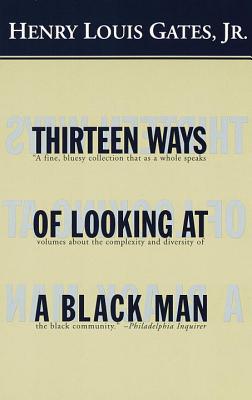Thirteen Ways of Looking at a Black Man

Thirteen Ways of Looking at a Black Man
"This is a book of stories," writes Henry Louis Gates, "and all might be described as 'narratives of ascent.'" As some remarkable men talk about their lives, many perspectives on race and gender emerge. For the notion of the unitary black man, Gates argues, is as imaginary as the creature that the poet Wallace Stevens conjured in his poem "Thirteen Ways of Looking at a Blackbird." James Baldwin, Colin Powell, Harry Belafonte, Bill T. Jones, Louis Farrakhan, Anatole Broyard, Albert Murray -- all these men came from modest circumstances and all achieved preeminence. They are people, Gates writes, "who have shaped the world as much as they were shaped by it, who gave as good as they got." Three are writers -- James Baldwin, who was once regarded as the intellectual spokesman for the black community; Anatole Broyard, who chose to hide his black heritage so as to be seen as a writer on his own terms; and Albert Murray, who rose to the pinnacle of literary criticism. There is the general-turned-political-figure Colin Powell, who discusses his interactions with three United States presidents; there is Harry Belafonte, the entertainer whose career has been distinct from his fervent activism; there is Bill T. Jones, dancer and choreographer, whose fierce courage and creativity have continued in the shadow of AIDS; and there is Louis Farrakhan, the controversial religious leader. These men and others speak of their lives with candor and intimacy, and what emerges from this portfolio of influential men is a strikingly varied and profound set of ideas about what it means to be a black man in America today.
PRP: 132.27 Lei
Acesta este Prețul Recomandat de Producător. Prețul de vânzare al produsului este afișat mai jos.
105.82Lei
105.82Lei
132.27 LeiLivrare in 2-4 saptamani
Descrierea produsului
"This is a book of stories," writes Henry Louis Gates, "and all might be described as 'narratives of ascent.'" As some remarkable men talk about their lives, many perspectives on race and gender emerge. For the notion of the unitary black man, Gates argues, is as imaginary as the creature that the poet Wallace Stevens conjured in his poem "Thirteen Ways of Looking at a Blackbird." James Baldwin, Colin Powell, Harry Belafonte, Bill T. Jones, Louis Farrakhan, Anatole Broyard, Albert Murray -- all these men came from modest circumstances and all achieved preeminence. They are people, Gates writes, "who have shaped the world as much as they were shaped by it, who gave as good as they got." Three are writers -- James Baldwin, who was once regarded as the intellectual spokesman for the black community; Anatole Broyard, who chose to hide his black heritage so as to be seen as a writer on his own terms; and Albert Murray, who rose to the pinnacle of literary criticism. There is the general-turned-political-figure Colin Powell, who discusses his interactions with three United States presidents; there is Harry Belafonte, the entertainer whose career has been distinct from his fervent activism; there is Bill T. Jones, dancer and choreographer, whose fierce courage and creativity have continued in the shadow of AIDS; and there is Louis Farrakhan, the controversial religious leader. These men and others speak of their lives with candor and intimacy, and what emerges from this portfolio of influential men is a strikingly varied and profound set of ideas about what it means to be a black man in America today.
Detaliile produsului










